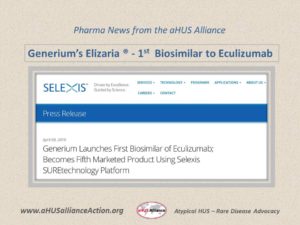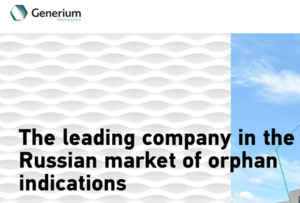
In recent news, the Russian biopharmaceutical company Generium announced its launch of a biosimilar to eculizumab, currently the only drug approved for patients with atypical hemolytic uremic syndrome (atypical HUS or aHUS). Eculizumab, also known by its registered ‘brand name’ Soliris®,was developed by Alexion Pharmaceuticals whose corporate website notes this therapeutic drug is available to aHUS patients in over 40 nations. The announcement of biosimilar to eculizumab came in an April press release from Selexis, a Swiss company that also has a North American office in California, in partnership with Generium JSC, also known as Generium Pharmaceuticals and based in Moscow. Interestingly, the press release of the launch of a new therapeutic drug for aHUS, doesn’t mention a specific name for this biosimilar.
From their 9 April 2019 corporate press release from Geneva, Switzerland, and Moscow, Russia: “Selexis SA and Generium JSC today announced that a fifth Selexis SUREtechnologyPlatform™-generated biological product has been approved for marketing. The latest approved product is a biosimilar monoclonal antibody, eculizumab, indicated for the treatment of paroxysmal nocturnal hemoglobinuria (PNH) and atypical hemolytic uremic syndrome (aHUS). Generium is the first company in the world to develop and market a biosimilar of eculizumab.” (Click HERE to read more)
When one is left with more questions than answers, most people start searching for information. Is there a new drug for people diagnosed with aHUS? What is a biosimilar? What’s the science behind it, and what is the name of drug mentioned in the Selexis press release? What might this mean for aHUS patients, and the physicians who treat them?
A Bit about Biologic Drugs and Bisosimilars
Conventional medicines are usually made or synthesized as chemical compounds, and are made by following a specific chemical mix combined in set quantities. Pharmaceutical companies that bring a conventional drug to market have their investment costs for research and development protected by patent laws for a set period of time, which allows the company to garner profits from their work. Once the patent legally expires other companies can enter the market with a chemical composition identical to brand name drug, called a generic. The process is different for biologic drugs since they are derived from living animals and microorganisms. Living things are complex in form and function, with each lifeform differing from others of its type. While it’s relatively simply to copy a chemical formula and synthesize a generic version of a conventional drug, it’s not possible to create exact copies of a living thing. With biologic drugs, pharmaceutical companies attempt to create a highly similar drug which will be both safe and effective (a biosimilar) to a specific drug that came earlier (the ‘reference drug’, such as eculizumab) – but a biosimilar is not an exact duplicate of its reference drug.
Data-Driven Evidence
Science is data-driven, so a key first step regarding any potential new drug for patients with atypical HUS is to objectively review data and then look for positive evidence. All forms of experiment and research must be able to withstand the rigors of the scientific process and sound methodology, but it’s challenging to find balance with issues that include small patient numbers and the need to safeguard intellectual property. Nevertheless, research studies need to be valid and reproducible with the results shared with stakeholders.
At this point we’d normally cite research and clinical trial data, offering evidence of scientific studies regarding Generium’s biosimilar to eculizumab. Unfortunately, medical journals and research sites for complement and biopharma drug discovery yielded little factual information. Like the Selexis corporate press release noting that Generium launched a biosimilar but focused on their own company’s SUREtechnology Platform, search engines provided few facts in its sparse array of vague articles and brief statements from biotech, investment firms, or market analysis companies. Little documentation seems available about Generium’s biosimilar, to include scientific data related to the clinical trial process to bring Elizaria® to market for Russian patients with PNH. Our search of the Generium website found ‘Our Products’ where we discovered the drug’s name is Elizaria®, viewed their corporate pipeline, and found Generium’s corporate press release on the launch of Elizaria®. Their website’s subpage for Preclinical and Clinical Studies does not seem to list study results or publications, but does state “GENERIUM is a full-cycle company with the resources and competencies necessary for conducting clinical and preclinical trials that meet international quality standards GLP and GCP. Having our own preclinical and clinical research centers gives the GENERIUM an advantage over external CROs in the speed of the research, while maintaining a comparable level of quality.” We were not able to unearth much information from independent references, articles, data from studies or journal articles by researchers.
As noted by Fitch Solutions, an analyst firm in the healthcare and pharma sectors, “…Russia is not amongst the most well-regulated markets; additional work would likely be necessary for approval in the US or EU.”

Drug Access & Cost
Various corporate subpages of Alexion Pharmaceuticals have noted eculizumab is available in either ‘over 40’ or ‘over 50’ nations, which is about 25% of the world’s nations depending upon definition: 193 countries (United Nations), 206 (Olympics), or 249 (ISO Country Codes). Given that, interest is high for any aHUS drug which can address cost concerns, a key issue at the heart of lack of access to eculizumab. Drug access and cost issues were included within the 2019 aHUS Global Patients’ Research Agenda. In an 25 March 2019 article (investment website) titled ‘Russia will produce equivalent of expensive orphan drug’ it stated that Elizaria® would be about 25% cheaper than eculizumab. Economics and the regulatory environment will dictate what happens when a safe drug equal in effectiveness to eculizumab hits markets where previous drug access has been limited and patient use restricted.
That Invest Foresight article offered a brief review and price comparison read in its entirety: “Russian pharmaceutical company Generium will manufacture a bioequivalent of Eculizumab at its facility in the Vladimir Region. The Russian branded product, Elizaria, will be about 25% cheaper than the original drug. In Western countries, a 24-month Eculizumab therapy costs up to RUR 45 mio ($700,250); in Russia, RUR 26-37 mio ($400,000-$580,000). The original drug, sold under the trade name Soliris, is produced by the American company Alexion. Russia is now the only country that has set up a full-cycle production of an Eculizumab bioequivalent. Last year alone, Russia spent RUR 8.3 bln (almost $130 mio) to purchase Eculizumab – more than one-third of the total allocations for the treatment of orphan conditions. The drug is used to treat paroxysmal nocturnal hemoglobinuria (PNH) and atypical hemolytic uremic syndrome (aHUS). The highest selling price of Elizaria, registered by Generium, is RUR 248,000 ($3,860) per pack, which is 25% cheaper than Soliris. Biocad, a leading Russian innovative biotech company, plans to complete the bioequivalence study for its own version of Eculizumab in 2025.” (aHUS Alliance note: see the end of this article for more on Biocad and pharma)
There are various perspectives about biosimilars being a safe and effective ‘bioequivalent’ to the original reference drug. Mark Terry wrote in his Biospace article What’s Going on With the Biosimilar Market?, “Although a moderate presence in Europe, with about 25 biosimilars approved and on the market, they haven’t gained traction in the U.S. Even though at least 11 have been approved in the U.S., only about three are available…” In an article for the Center for Biosimilars, Kelly Davio wrote that while 50 biosimilars have been approved in Russia no clear regulatory guidelines have been established for biosimilars and some products have reached market with only limited clinical data. From the perspective of aHUS patients and their families, we encourage all research teams and pharmaceutical companies to present study results and clinical trial data that’s comprehensive and internationally accessible to physicians and patient advocacy groups. Knowledge and treatment advances in the aHUS space are exciting, but best understood and utilized with more evidence, clear context and transparent dialogue.
Biosimilars – Learn More
How do Drugs and Biologics Differ? (BIO.org: Biotechnology Innovation Organization)
Small molecule versus biological drugs (Generics and Biosimilars Initiative, GaBI)
Biosimilars: More Treatment Choices and Innovation (USFDA: US Food & Drug Administration)
Additional Articles related to Generium and Eculizumab
Selexis’ biologic platform generates first-ever approved Soliris biosimilar (Maggie Lynch, BioPharma Reporter)
With Eculizumab Biosimilars Closing in, Alexion Granted Priority Review for ALXN1210 (Kelly Davio, The Center for Biosimilars)
Other Pharma with interests in developing a Biosimilar to Eculizumab
Amgen, ABP 959 for patients with PNH
EU Clinical Trial, ABP 959: EudraCT Number: 2017-001418-27
USA Clinical Trial ABP 959: ClinicalTrials.gov ID: NCT03818607
Samsung Bioepis Co. Ltd, SB12 aHUS Alliance, Trials Watch 7
Biocad Even as Russian Biosimilars Advance, Providers Have a High Unmet Educational Need (Kelly Davio, The Center for Biosimilars)
See Also the aHUS Alliance – 2018 Drug Pipeline: Drug Discovery and Market Factors within the Atypical HUS Arena
(ISU Abxis’ ISU305, and Genentech/ROCHE’s SKY59/RO711268)
L Burke (May 2019)

